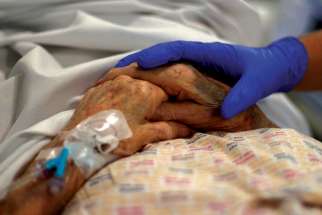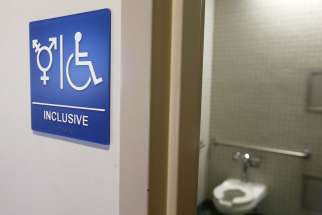Editorial: Leo XIII’s wisdom
If last week’s chaos that descended on Ontario schools, their pupils, families, and employees proves anything, it’s how the language of rights can lead to grievous wrongs.
Understanding comes at the peripheries
Having to wait in a hospital emergency department, I had leisure to observe and absorb other waiters. After sitting awhile, awareness emerges: a bruised old man assisting a limping woman to her chair; a lady with a big angry voice protecting her cart filled with plastic bags; a wrapped-up woman chattering to nobody about having the shakes; a tall woman talking on her phone, trying to rouse interest in her suicidal feelings; and the staff, with varying degrees of patience, performing the dance of triage.
As I took it in, my brother’s favourite question came to mind: “Where’s God in all that?”
That led to a second question. Can theology make any difference in the grittiness of life? Yes, though we need good solid theology. We need it to meet us where we are. We need it to open us up and take us where we can’t otherwise get to. And we need it acutely at the peripheries.
But how do we help those who wrestle with life’s questions, in ways that don’t seem to be clearly marked on the map of Church teaching? How not to get torn apart amidst the anxiety and desperation?
These questions come up for me and my colleagues in our counselling service, which has a special outreach to people of faith. We seek to wrestle with them within the Church’s tradition. We appreciate respected priests and theologians who can help us flesh out Church teaching in difficult situations.
Our faith, handed down through millennia, doesn’t need safeguarding as though it were weak and fragile. It can withstand the quarrels, mistakes and egos of our era. We can’t be satisfied with having our minds formed by media or allowing our prayers to be made for us by popular movements. What we can do, instead, is allow our intelligence and knowledge to be formed by our faith. We need an ascetical, teeth-grinding effort to understand others — the ones we agree with and those we don’t — and bring our lives to the core of our faith.
In the Church’s formative days, apologists like St. Justin described the truths of the Christian faith in reasoned ways. They could also hear and understand what society was saying, and show the meeting place between the two. We can’t reach such understanding alone in the safety of our rooms. And we can’t get there by picking up secular pious fads and slogans and importing them unthinkingly into church.
We need to take time and care to figure out what our church, and our Church, needs to pray for. We could try some asceticism of the mind: using our intellect to painstakingly see and understand the times, while carefully learning and growing in our theology. St. Anselm’s brilliant definition of theology is “faith seeking understanding.” Understanding comes by doing the humble work of learning Christ’s way and learning to hear the questions and groanings of our society. Otherwise, we miss an opportunity to be of service as the incarnate Church.
That was the inspiration of the Second Vatican Council, and that is the “high adventure” to which we are called by our baptism. We need today’s Church apologists sifting and responding in faith to the needs and philosophies of our time. This is the asceticism of “faith seeking understanding” in our day.
However, we can’t just stuff our heads with knowledge and platitudes, hold our breath and wait for death. Our faith and understanding must be tested with our life. Behavioral psychologist B.F. Skinner, apparently, used research experiments in raising his children. Physicist Isaac Newton performed experiments on his own eyes to test his theories. I don’t recommend putting one’s children or body at risk in seeking proof of a theory. But our faith does require us to learn, and we need to test or “prove” our faith by walking on it, as babies walk on their soft little feet and Peter walked on the sea.
Can we take our faith off the dusty back shelf into life? Christianity is a laboratory: test it out and see if it’s real. Everybody should know, and test with their lives, what St. Ignatius of Antioch said about the Eucharist.
Not doing so will lead to polarization of the Church. Power struggles polarize; truth is a compass.
Theologians, priests, bishops, all of us, need time to ask questions and listen, resisting the “easy” path of being formed by what appears on our phones. We need especially to learn and understand at the peripheries — in the emergency room or elsewhere. This requires humility.
Shall we bury our talents out of fear (Matthew 25:18) or spend ourselves, flawed and tainted though our efforts will be? It’s our job to bring our faith and theology to the questions and needs of our time, wherever we’re planted. Give your life away to get it (Matthew 10:39).
(Marrocco can be reached at mary.marrocco@outlook.com.)
Readers Speak Out: July 22-29, 2018
Prophetic letter
Re: Canada took wrong side in Humane Vitae debate (July 8-15):
Thank you Fr. Raymond de Souza for revisiting Humanae Vitae and the Canadian bishops’ undermining of the wisdom and beauty of Pope Paul VI’s encyclical on human life.
It is worth reading afresh this prophetic love letter from Pope Paul VI, readily available on the vatican.va website.
Artificial contraception/birth control has resulted in worldwide misery. Dr. Janet Smith has done exceptional work in recording this.
As artificial birth control grew in use, so did the rate of divorces and the rate of STIs. Fr. Silvestre Birngruber in his 1954 book, Morals for Lay People, wrote: If artificial contraception becomes widely practised, abortion on demand will follow as a natural consequence.
We know the truth of this prediction. Pope Paul VI also foresaw the tragedy if public authorities/governments became involved in artificial birth control.
One doesn’t need advanced degrees in medicine to realize that one cannot keep pumping chemicals into a woman’s body and not expect undesirable consequences.
David Hogg,
Toronto, Ont.
Comment: There is no excuse for compromising our faith
I just read about a priest in Italy who took down a crèche because he feared it would offend non-Christians. There was no indication he was forced to do it, but it seems he decided to be proactive just in case.
Comment: Church must reach out on gender issues
Cardinal Willem Eijk of the Netherlands recently called on Pope Francis to write a major document on the growth of gender theory. Too many people, including Catholic parents, now accept that one can choose their own gender. Many Catholic school leaders in Canada have also bought into that idea.
Court strikes a blow for religious freedom in Trinity Western case
Canadians living jam-packed lives barely have time to read their watches, much less pore over voluminous legal judgments on pressing matters of the day.






